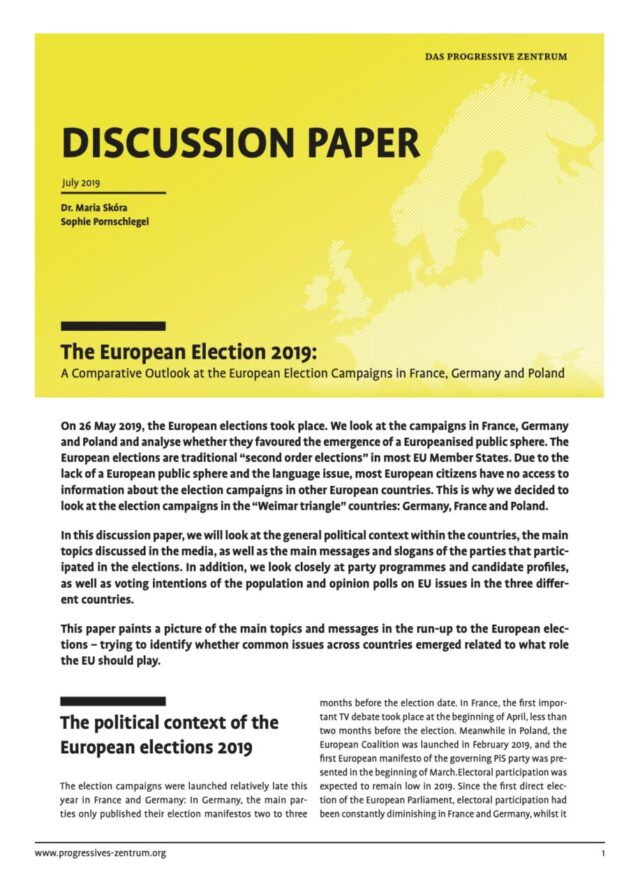Summary
The discussion paper takes a closer look at the European Election Campaigns 2019 in France, Germany and Poland and analyses whether they favoured the emergence of a Europeanised public sphere.
The Key Take-Aways
- All three countries experienced a clear politicisation of the public sphere, but their campaigns remained very national in their characters and showed great differences.
- The emergence of a European public sphere should, therefore, be a goal of high priority for those who seek a real democratisation of European elections and the EU as a whole.
Background: The European Elections as „Second-Order Elections“
The European elections are traditional “second-order elections” in most EU Member States. Due to the lack of a European public sphere and the language issue, most European citizens have no access to information about the election campaigns in other European countries. This is why the authors decided to look at the election campaigns in the “Weimar triangle” countries: Germany, France and Poland.
Their work shows greater differences in the national discussions related to the EU in the run-up to the European elections: Germany experienced protests and public debates around Article 13 (“Upload filters”) of the EU copyright reform and rallies that defended the EU against rising nationalism. In France, President Macron and his vision of a „European Renaissance“ as well as climate and environmental policies dominated public debates. Poland focused on debates about its prospects of joining the Eurozone and the chances of wage and living standard convergence between the European core and new Member States.
What the EU needs: A European Public Sphere
The authors observe that despite these national politicisations, the interest of voters in the European campaigns remains limited through language and media consumption – the EU still is considered “far away” and still blamed by the far-right and the far-left for not being accountable, intransparent and responsible for many woes, rather than being seen as a vehicle for common cooperation and tackling urgent challenges such as climate change, migration or inequalities.
Therefore, they conclude that if we want to avert this criticism and protect our democracy, we need to work on building a truly transnational community that is stabilised by the emergence of a European public sphere: through stronger and more coordinated European parties, increased exchanges among parliamentarians, and also a converging media landscape and increased education about political systems in neighbouring countries.
Authors
More diverse than united? A comparative analysis of the EU elections 2024
Paving the Way Towards Common Values
Conference Study: Trying Times – Rethinking Social Cohesion
Democracy Lab Progress Report 2017/2018
Before the Election: Insights from the US Industrial Heartlands
Foreign Policy for the Middle Classes: New Industrial Policy in Times of Geoeconomic Shift
More diverse than united? A comparative analysis of the EU elections 2024
New Progressive Ostpolitik for Europe

Content

We develop and debate progressive ideas and bring together leading actors who turn thoughts into action. Our think tank’s goal: making the just transformation a reality. ▸ Learn more


